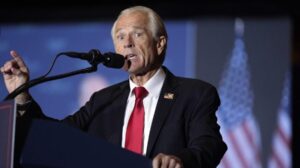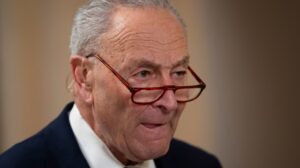Congress
Trump wants House to ‘get on board’ with Washington budget fix
President Donald Trump wants Congress to repair a significant cut to the District of Columbia’s budget and is happy to leave the procedural details to Speaker Mike Johnson, according to two White House officials.
But the president is prepared to work the phones — or, if needed, fire off a social media post — to correct legislative language that could have major repercussions for the capital city if left unaddressed.
Last Friday, the Senate passed a Trump-endorsed bill that would restore as much as $1.1 billion in local funding, according to District officials, that was — inadvertently, by some accounts — slashed by the government spending measure signed into law the next day.
The president has confidence the speaker will bring the bipartisan measure up for a vote, said a White House official granted anonymity to discuss Trump’s thinking.
How the bill gets through the House, however, is “sausage-making in the background,” said the official. “I don’t think he’ll publicly call for Johnson to bring [the fix] to the floor — that’s going to be a behind-the-scenes thing. If [Trump] must, though, a pressure campaign from Truth Social is always a possibility.”
If need be, Trump also is open to making calls to individual House members to ensure their support for the budget fix: “The president has no problem using his phone to make sure members get on board with what he’s trying to do.”
A second White House official, also granted anonymity to share private conversations, described the District of Columbia cut in the funding bill as “an oversight” that would eventually be fixed. That official said the White House wasn’t pressuring House GOP leaders and was giving Johnson space to figure out the way forward.
But Trump could, at some point, grow impatient: part of his interest in getting the budget fix approved is about extending an olive branch to Washington Mayor Muriel Bowser, one of the White House officials said.
While Bowser has pushed back on the threat to the city’s budget, she has mostly spoken respectfully about Trump and has recently taken steps to comply with GOP priorities for the city — for instance, dismantling the “Black Lives Matter Plaza” her administration set up near the White House amid the 2020 racial justice protests.
She so far has been viewed by the White House as a “good actor” in the endeavor to get the budget fix enacted, according to the official.
Still, congressional Republicans note the city won’t run out of money in the meantime; they also argue the shortfall is closer to $500 million, not $1.1 billion. In any case, local elected officials and their allies say a failure to enact the repair bill would effectively force the District of Columbia to make dramatic mid-fiscal-year cuts to law enforcement, infrastructure improvement efforts and public education.
As House Republicans worked to advance a seven-month funding bill to avert a government shutdown last week, GOP leadership did not include routine language allowing the District to continue spending its local budget dollars. And while leaders made several changes to the bill text just before bringing it to the House floor for a vote, they didn’t address Washington’s funding omission.
It caught many senior lawmakers off guard.
“It came as a surprise to me and explains why the mayor has called me,” Senate Appropriations Chair Susan Collins of Maine said in an interview. “It certainly wasn’t something we did.”
House Appropriations Chair Tom Cole (R-Okla.) at first told reporters he thought the omission was to rescind funding for “a lot of inaugural stuff,” saying “we’re not leaving inauguration funding going to D.C. in a bill when there’s not an inauguration.”
He later acknowledged that not all the slashed funding fell under that inauguration category, but he declined to address it, saying he’d have to “look at it in more detail” and that “it’s actually in the weeds.”
Many facets of the District of Columbia are subject to congressional oversight, but most of the city’s $21.2 billion budget is funded by local taxpayers. Roughly $5 billion comes from the federal government — the vast majority through formula-based federal programs, such as Medicaid, similar to what states receive.
Johnson now has to figure out when and how to bring the bill up for a floor vote amid opposition from hard-liners in his rebellious conference. GOP leaders feel like they have some time to figure out the way forward.
The speaker is not currently planning to advance the bill Monday through the Rules Committee, which would pave the way for a floor vote requiring a simple majority that could splinter Republicans on a procedural motion needed to bring the measure forward. Most likely, Johnson will need to pursue an expedited floor maneuver in the coming weeks that requires a two-thirds majority vote to secure passage.
Outside pressure — not just from Trump — could continue to build. City residents gathered outside the tiny House Rules Committee room for its initial meeting to set parameters for floor debate on the stopgap funding bill, raising alarms and objections to lawmakers about the consequences of the cuts.
Congress
Sinema lands at Hogan Lovells
Former Sen. Kyrsten Sinema, the centrist dealmaker who wielded virtually unilateral veto power over the Biden administration’s legislative agenda, has landed on K Street.
The Arizona Democrat-turned-independent is joining the law and lobbying firm Hogan Lovells, where she will serve as a senior counsel in the global regulatory and intellectual property practice, the firm announced Monday.
Sinema said in an interview that she will not register to lobby, but instead will advise businesses across industries “understand, anticipate and influence the shifting regulatory landscape” and help them “navigate the intersection of business and government.”
The hire marks a jackpot for the firm, given Sinema’s intimate involvement in shaping some of the most significant pieces of legislation of the last four years, including the Inflation Reduction Act, bipartisan infrastructure law and the CHIPS and Science Act, in addition to landmark gun control and marriage equality legislation and a scrapped border security bill.
Sinema, a former member of the Senate Banking, Commerce, Appropriations, Veterans Affairs and Homeland Security committees, told PI she’ll be working mostly with clients in industries where she’s long “had interest and expertise,” including AI and technology, fintech, crypto and private equity. She said she was drawn to Hogan Lovells because of the firm’s growing global regulatory practice and its focus on leading-edge industries in the tech space.
Though her new role is Sinema’s most significant step into the influence industry since leaving office earlier this year, it isn’t her first. In January, Sinema joined the global advisory council at crypto exchange Coinbase alongside Chris LaCivita, President Donald Trump’s 2024 co-campaign manager. Sinema also formed the Arizona Business Roundtable, which retained Mehlman Consulting in January to lobby on tax issues.
Sinema was known as a reliable ally of the business community during her time in the Senate. She voted against several of former President Joe Biden’s labor nominees and opposed increasing the federal minimum wage, provoking the ire of the Democratic base.
Sinema also single-handedly rescued the carried interest loophole during IRA negotiations — a tax provision that proponents in private equity, real estate and venture capital are once again gearing up to protect.
“I’ve really focused on helping people solve complex challenges and problems, bringing unlikely people together in a room to find unlikely outcomes,” Sinema said of her record as a legislator, which spanned 12 years in Congress and nearly a decade in the Arizona legislature.
Even though Sinema’s retirement coincided with the exits of several other centrist dealmakers in Congress, “there’s always opportunities for bipartisan action,” she contended. “It’s really about providing a perspective that allows people to see the benefit for them in engaging in those trust-based relationships, and providing a pathway that makes it reasonable and beneficial for people to do that work.”
Congress
Capitol agenda: The GOP’s 3 big tests in April
Republicans are facing a trifecta of major challenges this week on President Donald Trump’s legislative agenda, his trade war escalation and the biggest test of the party’s political staying power since November. Here’s a rundown of what’s coming.
News on Trump’s legislative wish list: Senate Republicans will move as soon as Wednesday to start advancing the budget plan Congress has to approve to enact Trump’s tax cuts, border agenda and energy policies.
Senate Republicans are aiming to adopt a budget resolution before leaving for the weekend. A vote-a-rama could start as early as Thursday.
Before they get there, senators expect to receive a decision from the Senate parliamentarian as soon as Tuesday or Wednesday on whether they can use an accounting maneuver known as current policy baseline, which would allow them to treat an extension of Trump’s 2017 tax cuts as not costing anything. The Senate GOP needs the parliamentarian to make that call before moving ahead.
On the sidelines, the “Big Six” tax negotiators — Speaker Mike Johnson, Senate Majority Leader John Thune, Treasury Secretary Scott Bessent, National Economic Council Director Kevin Hassett, Senate Finance Chair Mike Crapo and Ways and Means Chair Jason Smith — are set to meet Tuesday. Senate Finance Republicans will meet ahead of time on Monday night. House Ways and Means Republicans will gather Thursday for an all-day session to continue hashing out the tax bill.
Even if Republicans succeed in nailing down a budget blueprint before Easter, they’re still punting key fights over how to pay for Trump’s plans. Trump’s push for action now and unity later has the House and Senate GOP moving ahead with budget numbers that don’t match up — meaning the chambers’ committees aren’t aligned on deficit reduction targets. House committees will be asked to cut at least $2 trillion, while Senate committees might be directed to find a minimum of a few billion dollars.
Tariff tensions: Trump is threatening to ratchet up tariffs Wednesday — what he’s calling “Liberation Day” — and Hill Republicans are scrambling to shield their states from the impacts. GOP lawmakers are coordinating with industry groups to push for exemptions.
What makes it harder for Republicans is that no one but Trump is fully certain what these tariffs will look like. That’s causing unease among White House officials and Trump’s allies. Senate Democrats are hoping to capitalize on Republican discomfort around the issue by forcing a vote aimed at blocking Trump’s Canada tariffs as soon as Tuesday.
One of the reasons Trump has been pushing to increase the scope of the tariffs is to be able to claim hundreds of billions of dollars in more revenue that he believes will pay for a large chunk of his massive domestic policy bill, said three people with direct knowledge. Some Republicans are anxious about this move, arguing it’s a clear-cut budget gimmick and that tariffs likely won’t drive that much revenue.
Trump’s political test: Two special elections are on tap Tuesday in Florida to replace former Reps. Matt Gaetz and Mike Waltz. Republican Randy Fine’s bid to succeed Waltz in the state’s deep-red 6th District has been a huge headache for the GOP, with the party fearing the race will be closer than expected. As BLN reported last week, NRCC chief Rep. Richard Hudson and Majority Whip Tom Emmer warned Fine to “get his shit together.”
Meredith Lee Hill, Jordain Carney, Jennifer Scholtes and Benjamin Guggenheim contributed reporting.
Congress
Will Michael Bennet Shift his Fight Against Trump to the State House?
Michael Bennet seemed destined for a lifetime appointment to the Senate.
He was tapped for a vacancy in 2009, the same moment Colorado was turning perpetually blue. The Democratic son of the former staff director of the Senate Budget Committee and grandson of another political hand, Bennet brought lineage, his own impressive resume and, most significant of all, a thoughtful, affable and moderate sensibility to a chamber that once rewarded all three qualities.
Yet after accumulating 16 years, and well-positioned for another decade-plus of service having just turned 60, Bennet is poised to walk away from seniority, the Senate and Washington, the city where he was raised.
He’s frustrated with Congress, yes, but also Joe Biden’s selfishness, what Donald Trump has done to both parties and the corrosive impact of social media on politics, the media and even the once-presumed idea of shared facts.
Bennet is almost certain to run for governor in his adopted state next year, according to multiple Democrats in Washington and Denver.
In an hour-long interview this week, Bennet made little attempt to hide his intentions, telling me he’ll reveal his plans in early April.
“The central fight is whether or not we can create an economy where people feel like when they work hard they get ahead,” he said. “And I think the answer to that over the next decade is as likely to come from the states as it is from Washington.”
Reminded about his father’s staff tenure — stints with a pair of Cold War senators in addition to his committee post — the senator noted that Douglas Bennet Jr. also eventually left the Senate to run USAID and eventually NPR and Wesleyan University.
“I wish he were still alive, because I wish I could ask him his advice,” Bennet said. “And I think what he would tell me is, notwithstanding the fact that he worked here and he loved this place, he also moved on to do other things. And he might say, take what you’ve learned and find a place to be as effective as you can be.”
That Michael Farrand Bennet is no longer sure the Senate is a place to be effective is as harsh an indictment I can recall of what was once unironically called the world’s greatest deliberative body.
He’s not the only lawmaker headed for the exits. Already this year, before the first quarter even ended, Democratic Sens. Gary Peters, Tina Smith and Jeanne Shaheen announced they wouldn’t run again.
Some of this owes to simply hitting retirement age or dreading a prolonged life in the minority. But when taken together with all the lawmakers in both parties who’ve walked away since Donald Trump’s first election, it’s undeniable that what was once a political pinnacle has become a place for some that’s just not worth the hassle.
After all, the Senate was usually what governors graduated to, even if they preferred their old jobs, not an office one left for the statehouse. Look no further than the trajectory of Bennet’s colleague and former boss: Senator, and former governor, John Hickenlooper. War and peace, treaties and the Supreme Court, affairs of state, were determined in the nation’s capital. Prisons, roads and schools were left to the states.
What makes Bennet’s frustrations so meaningful, and illuminating, however, is that they go far beyond the usual bill of particulars. Sure, he’s exasperated with — and has even compiled research about! — the trend toward the consolidation of power and the diminution of the committee barons he met when he arrived in the Senate in the last years of the World War II generation.
“The duties of the senators have been sucked up basically into the leadership of the Senate,” he said, adding that “the decision-making among the four corners in the Congress has in some sense dispossessed the other actors.”
Bennet dodged questions about whether Senate Democratic Leader Chuck Schumer should continue to lead the caucus, but was candid about the leadership void.
“I think we need a strategy, and I think we need a plan, and we need a message,” he said, adding: “And if current leadership can’t figure out how to do that, then the caucus will figure out how to do that.”
Is the current message entirely: Trump is bad?
“I think the current message is basically, yeah, Trump’s bad.”
Bennet’s obvious misery of serving in Trump-era Washington is in some ways more notable than his unhappiness with Schumer. And this gets at something that isn’t sufficiently appreciated. The departures, some voluntary and others less so, of anti-Trump Republicans have been well-documented.
But Trump has also made Congress a lot less appealing for serious-minded Democrats who want to legislate and suddenly find most of their GOP counterparts are barely coping, living a lie or in thrall to a personality cult.
“That has been a big change, that’s a big difference,” said Bennet, citing the departures of John McCain, Jeff Flake, Lamar Alexander and Bob Corker. “There are people here, but it’s also true across the country, for whom Trump’s approach to politics has become normalized.”
More to the point, he said: “I’d be lying, if I said — It’s tough when you got everybody on the other side voting for Pete Hegseth to be the secretary of defense.”
Put another way, there’s simply not going to be a robust debate over, say, the refundability of the Child Tax Credit, a Bennet priority, when every day revolves around what Trump or his administration just said or did.
He calls it “shirts and skins,” tribal politics, and he deplores the culture. But this is where I should note, clearly, what Bennet emphasized: that he’s eager to remain in the fray.
He wants to confront Trumpism, he said. And, for a 60-year-old, he is unusually conscious of his own mortality, a trait he may have because of his father’s passing at 79, his mother’s youthful escape from the Holocaust and his own treatment for prostate cancer.
I had suggested to Bennet that his own potential early exit from the Senate along with his brother James’s unhappy departure from the New York Times both had a tragic quality. Here were enormously talented siblings who would’ve flourished in an earlier, more consensus-oriented era.
“I don’t feel like I was born too late,” the senator said, after citing all the policy goals he’s still eager to enact on the economy, healthcare, education and sustaining the American dream. “I think that my expectations about where we would be and the progress that we have made turn out not to have been fulfilled. And I am becoming incredibly impatient with the notion that I could die before seeing this to-do list addressed.”
That impatience has intensified since Trump’s second election, an event that I told Bennet seemed to jar him. “It definitely did,” he acknowledged, “it definitely did.”
Which triggers his deep discontent with his own party.
Bennet has long been frustrated with Washington — he wrote a 2019 book lacerating “the pathological culture of the capital” — but Trump’s return seemed to mark a personal pivot point.
“I can’t say that I was surprised, but I find it shocking that the Democratic Party lost to Donald Trump twice, once after he took away a woman’s right to choose, you know, and with all of the convictions and everything else,” he said. “And you know what? I hate to say this, there are many things that I blame Donald Trump for but getting elected is not one of them.”
For that he blames Biden. Bennet himself barely left a mark when he ran for president in 2020 and he acknowledged Biden may have been the only Democrat who could have defeated Trump that year.
However, the Coloradoan was one of the first Senate Democrats to say publicly what was obvious to all of them: that Biden couldn’t win the election after his disastrous debate. And Bennet was one of the loudest critics of Biden’s decision to pardon his son, Hunter, on the way out of office.
His irritation doesn’t seem to have receded.
“What I would say to the American people who are frustrated that the Democratic Party has not fought hard enough to provide a compelling alternative to Donald Trump, a big piece of that was the decision that Joe Biden made to run for re-election,” said Bennet.
“The Democratic Party,” he continued, “didn’t show up as a fighting force during the Biden administration.”
But Bennet conceded that, no, he never privately urged Biden or the former president’s top aides to not run again in the first place. “I wish I had,” he said. “I wish we all had.”
Recalling a caucus meeting after the now-infamous debate, Bennet recounted telling his colleagues that “if we elect Donald Trump president, we will be the first generation of Americans to leave less opportunity, not more, for the people coming after us.”
That’s what plainly eats at Bennet. It’s not just Biden’s vanity, and the failure of the rest of the party to intervene well before last summer, but the deeper failures of Democrats and the potential implications of those failures.
Though much closer to the center than his party’s progressives, Bennet reflects the widened policy aperture of this moment and pans Democrats’ timidity from both the left and the right.
“When I think about this last election, was it important for us to make sure that we were extending the Obamacare tax credits for health care?” he asks. “Of course it was. But shouldn’t we be standing for universal health care in this country? Shouldn’t we be standing for universal mental health care, especially for our kids who have been so incredibly affected by Covid and by social media?”
Yet on education, an area of personal expertise dating to his time running Denver’s public schools, Bennet said his party needs to be bolder.
“We have to recognize that our system of public education has to be dragged from the 19th century to the 21st century, what are our ideas for that?” he said, all but rolling his eyes as he recalled that much of what Democrats say about the topic begins and ends with “forgiving student loan debt.”
And it wasn’t just 2024.
“The Democratic Party failed to make a compelling case in really a generation worth of elections,” Bennet argued.
He recognizes, however, that the great challenges of the present are less tactical than structural.
He’s no nostalgist — “I don’t mourn the analog world,” Bennet said — but he said “our tribal instincts have been concretized by the medium of the internet.” And it’s digital technology that must resolve that problem so that Americans can “have a shared understanding of the facts.”
Perhaps because of his brother — who was hounded out of his job as the Times’ editorial page editor by liberals angered over an op-ed written by conservative Arkansas Sen. Tom Cotton — or perhaps just because he’s a reader, Bennet returned repeatedly to what social media and its attendant algorithms had done to sow division and make folly of the Moynihan maxim that people are entitled to their own opinions but not their own facts.
“We have had many reactionary periods in American history,” he said. “Those have always been followed by a progressive period. Always, always. The only difference right now, between our lives and those lives, is we destroyed our journalism in America.”
The ”old political order has collapsed,” said Bennet and “the journalistic order has collapsed with it.”
But what remains, he emphasized, is his appetite for building what comes next.
“Whatever I do is not going to signify a retreat from anything,” Bennet said. “What I’m trying to figure out is where the fight can best be joined.”
Denver’s golden dome awaits.
-

 The Josh Fourrier Show5 months ago
The Josh Fourrier Show5 months agoDOOMSDAY: Trump won, now what?
-
Uncategorized5 months ago
Bob Good to step down as Freedom Caucus chair this week
-
Uncategorized5 months ago
Johnson plans to bring House GOP short-term spending measure to House floor Wednesday
-

 Politics5 months ago
Politics5 months agoWhat 7 political experts will be watching at Tuesday’s debate
-
Economy5 months ago
Fed moves to protect weakening job market with bold rate cut
-
Economy5 months ago
It’s still the economy: What TV ads tell us about each campaign’s closing message
-

 Politics5 months ago
Politics5 months agoHow Republicans could foil Harris’ Supreme Court plans if she’s elected
-

 Politics5 months ago
Politics5 months agoRFK Jr.’s bid to take himself off swing state ballots may scramble mail-in voting









